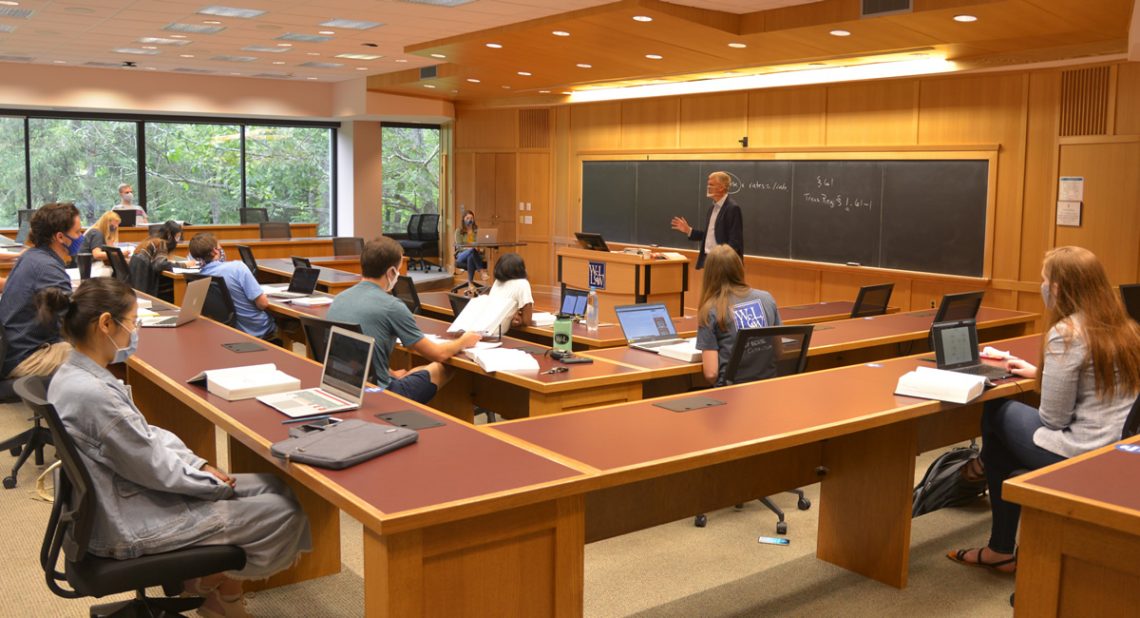
Classes Begin at W&L Law With the COVID-19 pandemic still spreading across the U.S., Washington and Lee Law has created an intricate but flexible back-to-school schedule that is based around individuals needs and the unpredictability of the future.
With the COVID-19 pandemic still spreading across the U.S., Washington and Lee Law has created an intricate but flexible back-to-school schedule that is based around the individual needs and the unpredictability of the future.
About 45% of classes are starting in a virtual format, for example, but with the intention of shifting to in-person instruction if surrounding conditions improve. Other classes are hybrids, meaning that students rotate in person on designated days and Zoom in on others, keeping the number of physically present people at acceptable levels. All students have the option to remain online or transition fully online at any point in the semester.
However, as of now, only around 5% of students have elected to learn completely virtually, said David Baluarte, associate dean of academic affairs and clinical professor of law.
“We have come up with this really complex situation where, to the maximum extent possible, we are respecting people’s wishes and what’s best for them.”
Thuan Tran ’21L attended his first day of classes virtually while waiting for his COVID-19 test results to come in. His classes were hybrids, he said, meaning that some students were online and others weren’t. Having professors address both in person students and virtual students, he said, while also wearing a mask and a microphone, would take some getting used to.
He is considering the benefits of attending classes completely virtually, because he likes consistency in his schedule.
“I don’t find a mostly or fully virtual classroom experience inherently terrible,” Tran said. “It allows me to plan out my day a lot more carefully and I can sometimes get more done.”
Many schools that spent the summertime creating re-opening plans did so under the assumption that COVID-19 cases would only dwindle and that the global pandemic would be behind us.
However, as of Aug. 18, Rockbridge County had 78 confirmed coronavirus cases, which is nearly triple the amount it had in March through May. Just weeks ago, the Virginia Department of Health logged the area’s first death, which was quickly followed by its second. Lexington, Buena Vista and Rockbridge County combined have seen around 180 confirmed cases.
Such a change in circumstances required “layers and layers,” of additional planning, Baluarte said.
It strengthened W&L Law’s preparations for in-person classes while also prompting more faculty members to decide to start the semester virtually. In person, seating has been removed to accommodate social distancing, and there is more time between classes to prevent hallway congestion. The Millhiser Moot Court Room, a large space that usually hosts guest speakers and moot court competitions, has become a primary teaching space because of its size.
Meanwhile, virtual learning has its own set of considerations, said Trenya Mason, dean of students for the law school. There are inevitable disparities in work-from-home situations among students, she indicated, and part of Mason’s job is working to ameliorate those inequalities.
“You’re faced with everything from broadband issues to other accessibility pieces, like access to computers,” she said.
Mason also cited law students with children at home who are learning quasi-virtually as well. In such situations, it might be ideal for them to have a designated study space outside the home.
“We’ve provided opportunities for that,” Mason said. “There are opportunities to reserve space within the law library online, and they can sign up to use a space for blocks of time.”
The financial consequences of the pandemic on the student body are also an issue, said Mason. Students who previously secured paying internships may have lost them, or families supporting students may have been compromised by the economy’s halt. In response, the school applied for an emergency fund program and was granted $25,000.
“[The funds] assist students who find themselves in [challenging] financial straits because of COVID-19,” she explained.
Ultimately, law students are able to seek and find help that is tailored to their unique circumstances, Mason said. “And that was true before the pandemic, too.”
While most students can be as physically distant from the law school as they want, third year law students who are representing clients through clinics are more tethered to the demands of the courts.
“That’s the one area where it needs to go forward,” Baluarte said. “We have professional responsibilities to clients—to zealously advocate for them—and balancing that against the public health situation, that’s a very interesting conversation to have.”
He added that it’s likely that their clients’ issues have been exacerbated by the pandemic. In immigration cases, for example, “the government has taken the opportunity to increase immigration restrictions, to come down harder on people,” Baluarte said.
“In no case will we stop representing a client because it’s too difficult because of the pandemic.”
